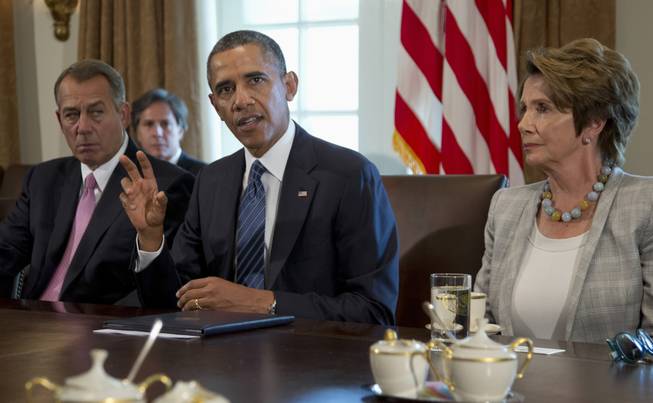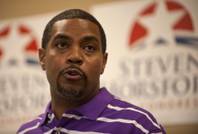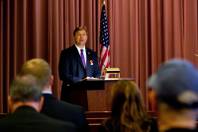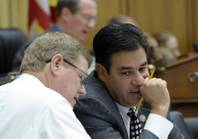
Carolyn Kaster / AP
President Barack Obama, flanked by House Speaker John Boehner of Ohio, left, and House Minority Leader Nancy Pelosi of Calif., speaks to media in the Cabinet Room of the White House in Washington, Tuesday, Sept. 3, 2013, before a meeting with members of Congress to discuss the situation in Syria.
Friday, Sept. 6, 2013 | 2 a.m.
Sun coverage
Asking Congress whether the U.S. should strike Syria put President Barack Obama in an unusual position among U.S. presidents, who have usually engaged in military conflicts first and asked lawmakers for their opinions later.
It’s also put the Nevada delegation in an awkward position. Thanks to the presidential history of asking Congress’ forgiveness instead of permission, few of Nevada’s representatives have ever had to decide to authorize a military strike before.
“No one knows how to do it. No one wants to do this,” said David Damore, UNLV political science professor. “But the president throwing this back to Congress is forcing them to answer the question: Hey, you want me to do all this stuff, now let’s see what you have to say.”
That Nevada’s delegation would be green when it comes to this once-in-a-blue-moon issue is hardly surprising: Four of its six members haven’t even logged three years in Washington yet.
Few of Nevada’s representatives had foreign policy experience before coming to Congress, either. It just isn’t one of those topics that comes up in the state Legislature, where most of Nevada’s lawmakers cut their political teeth and gained the experience that informs their decisions on matters ranging from land policy to health care to immigration.

Steven Horsford announces his intentions to run for re-election in the 2014 before a gathering of constituents at his campaign headquarters in North Las Vegas on Friday afternoon.
“I consider myself informed on international relations, but like many Americans … they’re not issues that we’re confronted with every day of our lives,” Rep. Steven Horsford said. “Until you are in a situation where you have to make a decision, you can always think about hypotheticals about what you might do. But this is real.”
The experience began one week ago.
Nevada’s delegation, still in the midst of their in-district work period, found out, along with the rest of the country, that the president would — for only the fourth time in the past 30 years — ask Congress to green-light a military operation before it started.
Horsford, in Washington for the 50th anniversary of Martin Luther King’s speech at the Lincoln Memorial, decided to prolong his stay to have access to the classified briefings.
“I have, first and foremost, taken advantage of every one of the briefings, both classified and formal, as well as the hearings, that were conducted this week,” Horsford said, explaining that he’d attended extra foreign policy committee hearings — a committee he doesn’t serve on — to gather all the information he could.

FILE: Congresswoman Dina Titus (D-NV) attends a rally for immigration reform at the Culinary Workers Union, Local 226, headquarters Monday, July 1, 2013.
Rep. Dina Titus, meanwhile, decided to stay in Las Vegas — where she couldn’t access much of the clandestine information being circulated, but where she could solicit opinions a little closer to home.
“She’s reaching out to constituents, trying to get their feedback and input and trying to see where they’re at and whether or not they would support a decision to use strategic limited force in Syria,” Titus’ spokeswoman Caitlin Teare said Thursday.
But in Nevada, it’s difficult to pinpoint where the natural constituency on Syria lies.
The state doesn’t have a particularly large population of Syrians or people from neighboring countries, and few foreign policy minds flock to Las Vegas. The state does have a very large veteran population, due in part to the presence of large military bases in Nevada.
But the veteran community isn’t projecting a unanimous position on this planned incursion, for which Obama has promised there will be no boots on the ground.
“I think Nevadans are as split on this as Washington, D.C., elected officials are,” noted Eric Herzik, UNR political science professor.
In that environment, lawmakers inexperienced in military authorizations who are pledging to stand by their constituents are being careful about committing to an opinion.

Sen. Dean Heller gives a memorial tribute during the 48th Annual Memorial Day Service at the Palm Downtown Mortuary and Cemetery in Las Vegas, Monday, May 27, 2013.
Sen. Dean Heller, who has been in Congress for six years but has not yet had occasion to cast a vote on authorizing military strikes, has put out one noncommittal statement on Syria. His office has quietly eased away from all further requests to clarify how he is thinking about this forthcoming vote in the Senate, now expected to take place on the anniversary of the Sept. 11 terror attacks.
“Reports of chemical weapon attacks on innocent women, men and children are appalling and must be taken very seriously,” Heller’s statement read. “While I continue to monitor the situation closely, I also urge President Obama and Congress to work together as our nation determines any course of action and to only consider military action as a last resort.”
Horsford and Titus, meanwhile, are saying they have more questions than answers.
“The key things I’m looking for is, where’s the multilateral coalition of partners ... why is the United States expected to do this alone?” Horsford said. “Secondly, what is the cost ... and third, what are our objectives?”

House Judiciary Committee members Rep. Raul Labrador, R-Idaho, right, and Rep. Mark Amodei, R-Nev. talk on Capitol Hill in Washington, Wednesday, May 22, 2013, during the committee's hearing on immigration reform.
Staff for Rep. Mark Amodei have been promising the congressman will release a statement on Syria — but as of press time, such a statement still had not materialized.
In comparison, the Nevada lawmakers who have taken military authorization votes in the past are not shying away from expressing their opinions about authorizing strikes in Syria.
But shared experience isn’t necessarily groundwork for agreement.

Barbara Teixeira, right, asks a question to U.S. Rep. Joe Heck, R-Nev. during a Town Hall at Windmill Library in Las Vegas on Tuesday, July 2, 2013.
Rep. Joe Heck, R-Nev., who co-led an effort in the House to oppose Obama’s plan to strike Libya in 2011, sits on the intelligence and armed services committees, and serves in the U.S. Army Reserves — though his service has not included strategizing foreign interventions.
He was the first Nevada representative to issue a statement on Obama’s plans, and his comments have been consistently negative.
“Does this present a clear and imminent danger to U.S. interests? I don’t believe the case has been made,” Heck said during a Tuesday interview on "Ralston Reports." “What is the end goal to us getting involved, other than the shot across the bow? And if that shot across the bow doesn’t work, what are we going to do?”

Senate Majority Leader Harry Reid (D-NV) gives opening remarks during the National Clean Energy Summit 6.0 at the Mandalay Bay Tuesday, Aug. 13, 2013.
Only Senate Majority Leader Harry Reid, D-Nev., has said he plans to vote to authorize Obama’s planned strikes on Syrian targets, arguing the U.S. has a “moral obligation” to rebuke Syrian President Bashar al-Assad’s use of chemical weapons against his own people, and that the strike would be “justified and necessary.”
The split between Heck and Reid can’t be chalked up to pure politics. There are Democrats and Republicans on either side of this issue, as the country saw earlier this week, when members of the Senate Foreign Relations Committee — citing concerns ranging from national credibility to defense sequestration — split along haphazardly political lines on passage of a Syria authorization measure.
“You have the liberals on the left, and the libertarians on the right, who are opposed to it,” Damore said.
Reid is the only member of the delegation who has already cast multiple votes on authorizing military interventions. His position on Syria isn’t wholly unlike his previous stances on prior wars: As a senator, he voted to authorize the wars in Iraq, Afghanistan and Operation Desert Storm — despite the fact that those campaigns were led by Republican presidents.
Like many others, Reid would later face significant criticism for his Iraq war vote — and later seek to end U.S. military presence there.
Thus far, the White House has been solely in charge of selling its Syria policy to rank-and-file members of Congress.
But political experts are not convinced that, if Obama’s plan is in jeopardy as the vote approaches, rank-and-file members will not start to get some serious pressure to support the resolution from their party leaders — especially Reid.
“Reid is an institutionalist — he’s going to support his president,” Damore said. “In general, you do find that when you don’t know much about an issue, and there’s nothing in your district or your state swaying you, the natural position is to follow your party leadership.”
Reid aides have told various sources that they expect the Syria resolution will pass the Senate; the fate of a resolution in the House is still not certain, though the leaders of both parties have said they would support military engagement.
Nonetheless, Nevada’s skeptical House members are rejecting the suggestion that they would put party loyalty over personal conviction in this case.
“With all due respect to leadership and the administration, I am going to make a decision that’s in the best interest of my constituents and the United States,” Horsford said.

Join the Discussion:
Check this out for a full explanation of our conversion to the LiveFyre commenting system and instructions on how to sign up for an account.
Full comments policy